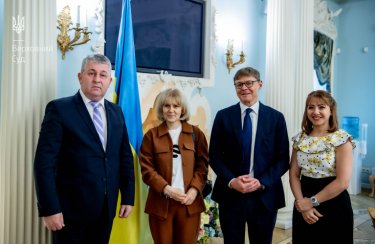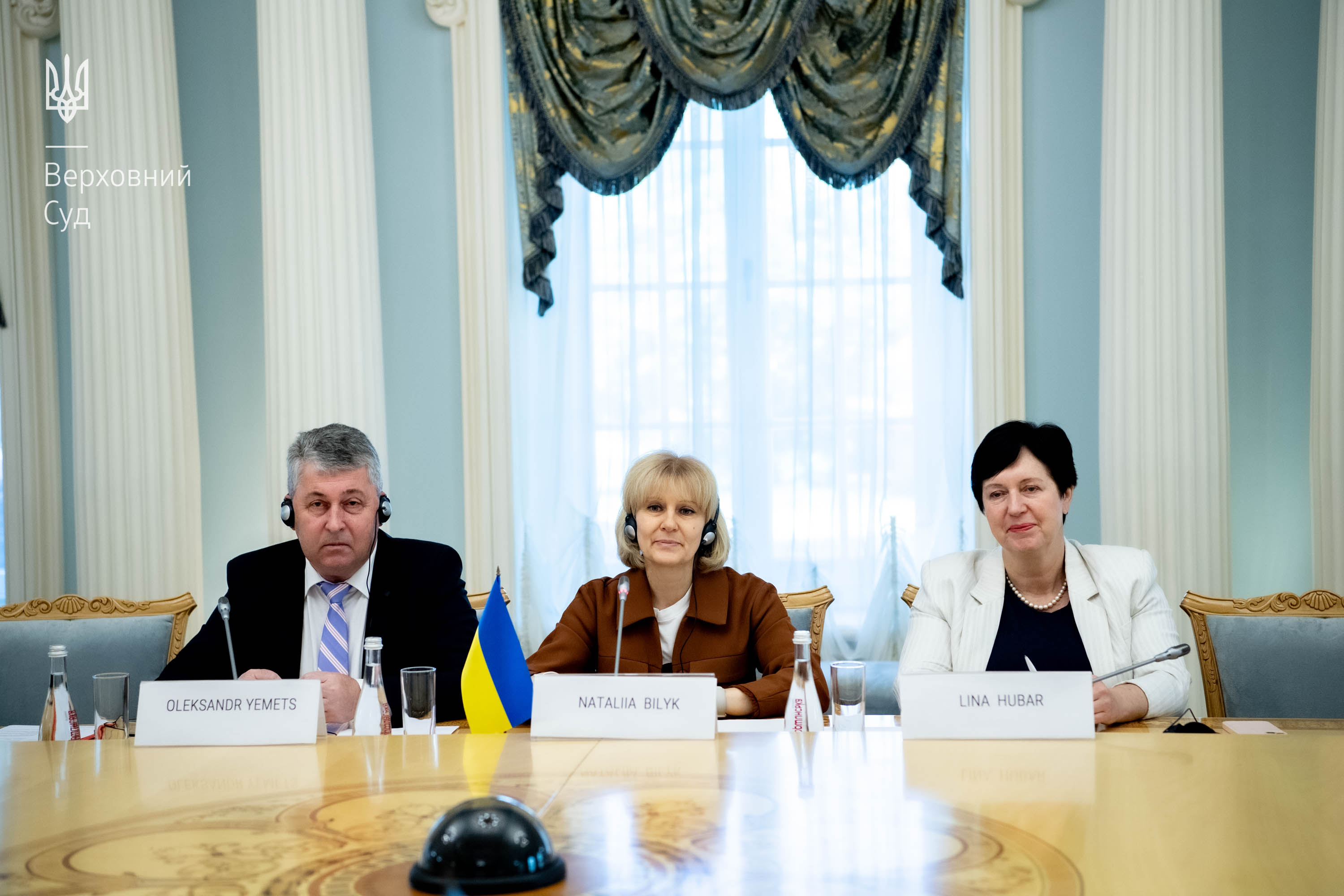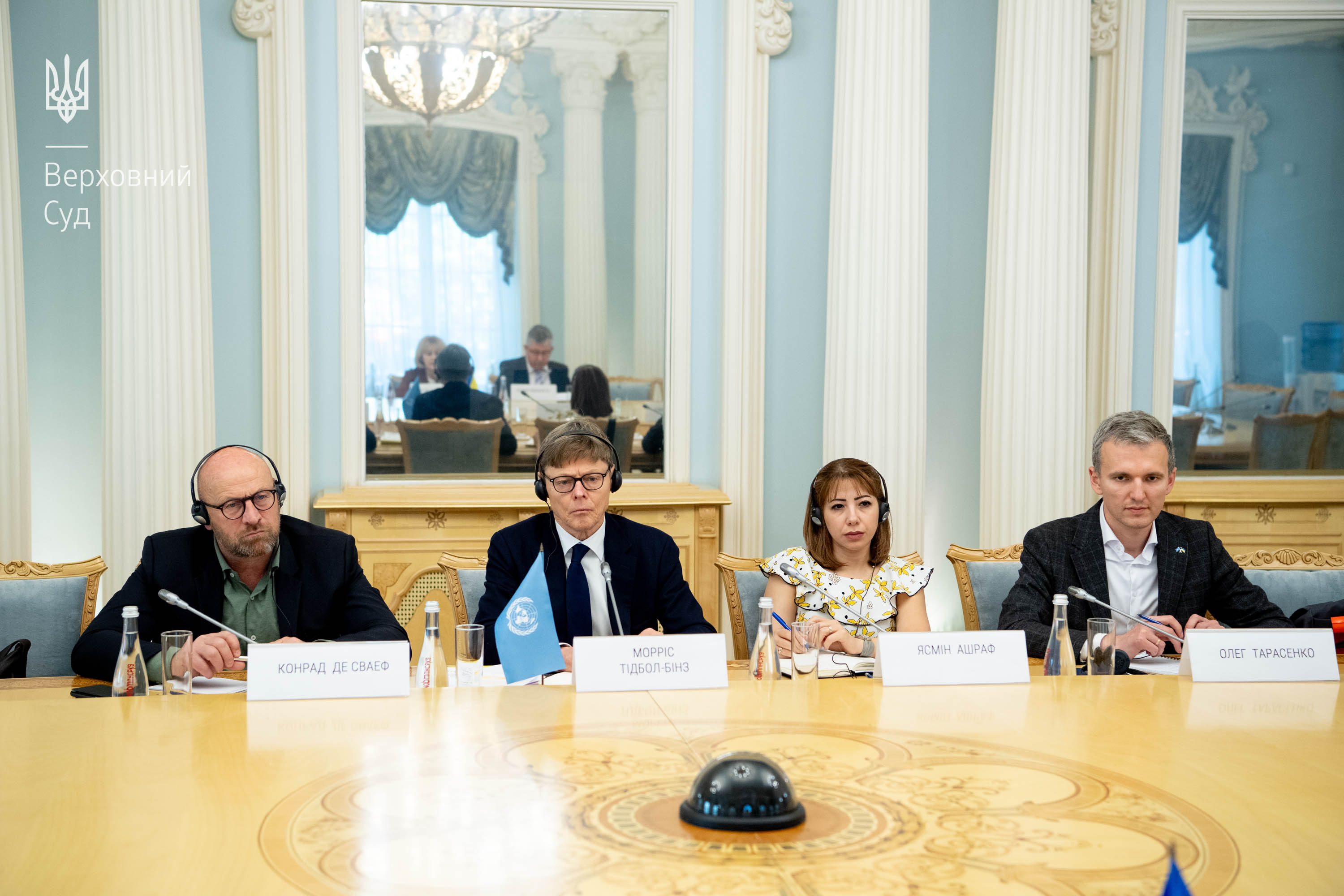Contact center of the Ukrainian Judiciary 044 207-35-46

During a meeting with the UN Human Rights Council Special Rapporteur on extrajudicial, summary or arbitrary executions, Morris Tidball-Binz, the Secretary of the Second Chamber of the Criminal Cassation Court of the Supreme Court, Nataliia Bilyk, and the Supreme Court Judge at the CCC, Oleksandr Yemets, briefed the delegation on the particularities of the consideration of criminal cases of war crimes related to Russia's armed aggression.
Nataliia Bilyk drew attention to the fact that as of today, the number of applications registered in the Unified Register of Pre-trial Investigations is almost 132,000. Of these, 128,000 relate to violations of the laws and customs of war. At the same time, the courts of first instance have already ruled on 1,000 cases. Of these, 100 cases were reviewed by the appellate courts, and 11 were reviewed in cassation.
In 2024, the Supreme Court issued two decisions that are important in shaping future national judicial practice in the adjudication of war crimes cases. In particular, the Grand Chamber of the Supreme Court determined the signs of the subject of the crime under Article 437 of the Criminal Code of Ukraine "Planning, preparation, initiation and waging of aggressive war", and the Criminal Cassation Court of the Supreme Court considered the first criminal proceeding for violation of the laws and customs of war under Article 438 of the Criminal Code of Ukraine.
The judge also emphasised that Ukraine was developing case law on the recovery of damages from the aggressor state. In particular, the cassation court ruled to deny the jurisdictional immunity of the Russian Federation. Martial law has also influenced the development of electronic justice, significantly speeding up all processes. However, many courts still struggle to use the latest technology. This is due both to the provision of special equipment to institutions and to the availability of electricity during court proceedings, which is not always predictable.

Oleksandr Yemets spoke about the peculiarities of training judges and their preparation for the adjudication of war crimes cases. In addition to studying national and international war crimes legislation, lawyers also attend lectures on war crimes. Among other things, Supreme Court judges visit foreign colleagues and study international experience, which they then pass on to the judges of the local and appellate courts.
The participants also discussed gathering evidence of war crimes. Among these, those obtained as part of a forensic medical examination occupy an important place, as they make it possible to assess the circumstances of the crime. However, modern technologies also help to collect digital evidence from open sources such as social networks, messengers, etc. Taken together, they provide the evidence needed to bring the perpetrators to justice.
According to Morris Tidball-Binz, the Ukrainian judicial system is now facing an extremely difficult challenge, as all cases are being investigated and tried not after the end of the armed conflict, as has always been the case, but during its course. At the same time, it is crucial to document and investigate each crime, as all cases constitute a serious violation of the right to life. International law and fundamental human rights are being violated.

During this time, national courts not only demonstrated their professionalism, but also set a new standard for investigating war crimes to ensure that perpetrators are brought to justice.
During the meeting, the parties discussed the provisions of Art. 437 of the Criminal Code of Ukraine, namely how the qualification and reference to international law is made. Yasmine Ashraf, a representative of the Office of the United Nations High Commissioner for Human Rights and a human rights expert, also inquired as to whether, given the significant number of cases of armed aggression, it would be feasible to consolidate them in order to expedite their consideration. However, Nataliia Bilyk explained that Ukrainian law provides for the consolidation of cases only in certain cases, so this mechanism cannot be used in this situation.
In terms of procedural aspects, they also highlighted the circumstances that may result in either an aggravated or mitigated punishment for the perpetrators.
Oleh Tarasenko, a member of the UN Human Rights Monitoring Mission, also joined the exchange of views. He emphasised the introduction of the in absentia procedure to deal with cases in this category. At present, most of them are considered without the presence of the accused, since extradition and the presence of the person during the trial are impossible. Therefore, the defence must do everything possible to ensure that the person's right to a fair trial is exercised in accordance with all norms of international law.
The meeting also focused on the understaffing of the courts, which has a direct impact on the process of examining cases and results in an extremely heavy workload for each judge.
The judges of the Supreme Court expressed their gratitude for the international community's comprehensive support for Ukraine at this difficult time. The parties expressed their confidence in further cooperation.
The meeting was also attended by Conrad de Swaef, a security expert from the Office of the United Nations High Commissioner for Human Rights, and Lina Hubar, Head of the Division for International Cooperation.